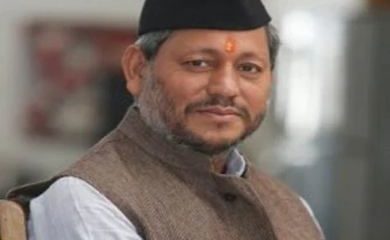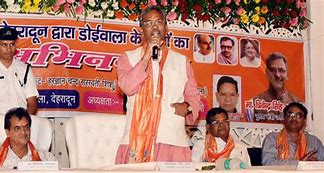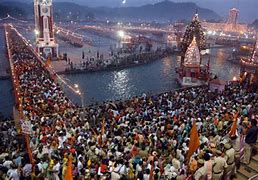Feature
Uttarakhand, Enemy Property Act likely to dominate parliament proceedings
 New Delhi:The proposed discussion on the 2016-17 Uttarakhand budget and the Enemy Property Bill are likely to generate much heat between the treasury and opposition benches in both houses of parliament during the coming week.
New Delhi:The proposed discussion on the 2016-17 Uttarakhand budget and the Enemy Property Bill are likely to generate much heat between the treasury and opposition benches in both houses of parliament during the coming week.
Numerically stronger in the Rajya Sabha, the opposition parties are geared up to embarrass the BJP-led National Democratic Alliance (NDA) government yet again as members insisted they could stall the passage of the Enemy Property (Amendment and Validation) Bill.
Congress spokesperson Manish Tewari has said the government’s move to take up discussion on the Uttarakhand budget a day ahead of the vote of confidence by the Harish Rawat government — as directed by the Supreme Court — is “unconstitutional”.
“The government should await the result of the floor test,” Tewari said.
Uttarakhand was placed under President’s Rule on March 27, necessitating parliamentary nod for the state’s budget.
According to sources, the government’s agenda for the ensuing week — the last week of the second budget session of parliament — also includes passage of bills pertaining to anti-hijacking, Indian trusts (amendment) and child labour (amendment).
In the Rajya Sabha, Congress members K. Rahman Khan, Hussain Dalwai and P.L. Punia have already submitted note of dissent on the Select Committee report on the Enemy Property (Amendment and Validation) Bill, 2016.
The report, prepared by a panel headed by Bharatiya Janata Party member Bhupender Yadav, was submitted on May 6.
“The provisions of the bill or the ordinance, as brought by the government, violates the very basic principle of natural justice, human rights and settled principles of law. The provisions of the present bill also disturb the balance on the subject. The new law will not sustain in a court of law,” a Congress member told IANS.
K.C. Tyagi (Janata Dal-United), D. Raja (Communist Party of India) and Javed Ali Khan (Samajwadi Party) also gave note of dissent identical to that of the Congress members.
The note of dissent says that this bill does not follow the lines of The Enemy Property (Amendment and Validation) Second Bill 2010, which was introduced in the Lok Sabha and referred to the standing committee.
“Further, the bill seeks to insert certain provisions which totally violate Articles 14, 19, 300A of the constitution and is also against the principles of natural justice,” it said.
The Enemy Property Ordinance, 2016, was promulgated on January 7 to seek amendments to the Enemy Property Act, 1968.
The amendments through the ordinance include one that says that once an enemy property is vested in the custodian, it shall continue to be vested in him as enemy property, irrespective of whether the enemy, enemy subject or enemy firm has ceased to be an enemy due to reasons such as death.
The Lok Sabha passed the bill in March.
In the Lok Sabha, where BJP sources claim the treasury bench scored a major victory during the debate on the AgustaWestland chopper deal on Friday, discussions on the Uttarakhand budget and passing of the Uttarakhand Appropriation (vote on account) Bill are listed by the government for Monday.
President’s Rule was imposed in Uttarakhand on March 27, ousting the Harish Rawat-led Congress government.
It was lifted following an Uttarakhand High Court order on April 21 but was reimposed by the Supreme Court a day later.
The apex court on Friday cleared the decks for Uttarakhand’s ousted chief minister Harish Rawat to take a vote of confidence on his government in the assembly on May 10.
Entertainment
Meghalaya Reserves Legalized Gambling and Sports Betting for Tourists

The State Scores Extra High on Gaming-Friendly Industry Index
Meghalaya scored 92.85 out of 100 possible points in a Gaming Industry Index and proved to be India’s most gaming-friendly state following its recent profound legislation changes over the field allowing land-based and online gaming, including games of chance, under a licensing regime.
The index by the UK India Business Council (UKIBC) uses a scale of 0 to 100 to measure the level of legalisation on gambling and betting achieved by a state based on the scores over a set of seven different games – lottery, horse racing, betting on sports, poker, rummy, casino and fantasy sports
Starting from February last year, Meghalaya became the third state in India’s northeast to legalise gambling and betting after Sikkim and Nagaland. After consultations with the UKIBC, the state proceeded with the adoption of the Meghalaya Regulation of Gaming Act, 2021 and the nullification of the Meghalaya Prevention of Gambling Act, 1970. Subsequently in December, the Meghalaya Regulation of Gaming Rules, 2021 were notified and came into force.
All for the Tourists
The move to legalise and license various forms of offline and online betting and gambling in Meghalaya is aimed at boosting tourism and creating jobs, and altogether raising taxation revenues for the northeastern state. At the same time, the opportunities to bet and gamble legally will be reserved only for tourists and visitors.
“We came out with a Gaming Act and subsequently framed the Regulation of Gaming Rules, 2021. The government will accordingly issue licenses to operate games of skill and chance, both online and offline,” said James P. K. Sangma, Meghalaya State Law and Taxation Minister speaking in the capital city of Shillong. “But the legalized gambling and gaming will only be for tourists and not residents of Meghalaya,” he continued.
To be allowed to play, tourists and people visiting the state for work or business purposes will have to prove their non-resident status by presenting appropriate documents, in a process similar to a bank KYC (Know Your Customer) procedure.
Meghalaya Reaches Out to a Vast Market
With 140 millions of people in India estimated to bet regularly on sports, and a total of 370 million desi bettors around prominent sporting events, as per data from one of the latest reports by Esse N Videri, Meghalaya is set to reach out and take a piece of a vast market.
Estimates on the financial value of India’s sports betting market, combined across all types of offline channels and online sports and cricket predictions and betting platforms, speak about amounts between $130 and $150 billion (roughly between ₹9.7 and ₹11.5 lakh crore).
Andhra Pradesh, Telangana and Delhi are shown to deliver the highest number of bettors and Meghalaya can count on substantial tourists flow from their betting circles. The sports betting communities of Karnataka, Maharashtra, Uttar Pradesh and Haryana are also not to be underestimated.
Among the sports, cricket is most popular, registering 68 percent of the total bet count analyzed by Esse N Videri. Football takes second position with 11 percent of the bets, followed by betting on FIFA at 7 percent and on eCricket at 5 percent. The last position in the Top 5 of popular sports for betting in India is taken by tennis with 3 percent of the bet count.
Local Citizens will Still have Their Teer Betting
Meghalaya residents will still be permitted to participate in teer betting over arrow-shooting results. Teer is a traditional method of gambling, somewhat similar to a lottery draw, and held under the rules of the Meghalaya Regulation of the Game of Arrow Shooting and the Sale of Teer Tickets Act, 2018.
Teer includes bettors wagering on the number of arrows that reach the target which is placed about 50 meters away from a team of 20 archers positioned in a semicircle.
The archers shoot volleys of arrows at the target for ten minutes, and players place their bets choosing a number between 0 and 99 trying to guess the last two digits of the number of arrows that successfully pierce the target.
If, for example, the number of hits is 256, anyone who has bet on 56 wins an amount eight times bigger than their wager.























